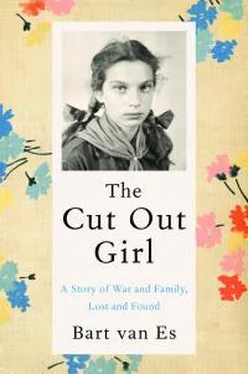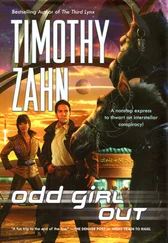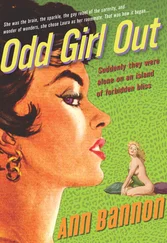—
OF THE EIGHTEEN THOUSAND JEWS in The Hague in 1940, two thousand survived. Of the four hundred old Portuguese Jews, so deeply embedded in the fabric of the state and the city, just eight returned. The entire Jewish orphanage, which stands across the road from me, was liquidated without survivors on March 13, 1943.
Three
Jew.” In May 1942 Lien sees her mother at the dining table in the kitchen with a large sheet of yellow cloth. There is a pattern of stars upon it with black outlines, each with a word printed at its center: “Jew.” Around every star there is a thin dotted line to make it easier to cut out. They must now wear these stars on each item of outside clothing, so Mamma carefully stitches a star reading “Jew” onto the silk of the Bonneterie dress.
The children on the street, whom she knows, are the same as ever, but those on the way to school are not so kind. Sometimes they throw stones. Then one day a group of children runs up and grabs her, pushing her into a side street, chanting “We have caught a Jew.” When she does not come home, her father goes out to find her. The gang backs away when it sees him, but once he takes her hand a bold lad edges closer. “Dirty Jew,” he mumbles, half embarrassed, poised and ready to run off. Pappa ignores him but not with his normal calmness; there is a tremor to his fingers as he leads her away from the alley and back to the flat.
As they reach number 31 they see Mrs. Andriessen standing in the stairwell of the apartment block, half out on the pavement, looking out for them. There is a worried, searching expression on her face and then a tense half smile of relief when she sees Lien. This feels odd because Mrs. Andriessen is almost always to be found in her soap-scented room. The old lady turns and calls something into the open door of their flat, her cheeks shiny and red. She seems to be telling Mamma that everything is all right. Lien suddenly thinks that because Mrs. Andriessen is allowed to stay with them at the Pletterijstraat she must also be Jewish, like they are, though she is not sure about that.
Aunt Ellie, on the other hand, is not Jewish, because she is not really an auntie, just a good friend of Mamma’s who visits all the time even though she doesn’t have to wear a star.
When the summer holidays come, Lien often stays in the yard or the kitchen or on the outside stairs at the front of the house. She gets to know Lilly, who lives at number 29 upstairs. Lilly draws four evenly spaced pencil lines into the album and copies a poem perfectly onto the middle of the page:
Roses big and roses small
Soft as velvet on a wall
But the softest petal part
Is the rose of Lientje’s heart.
Lilly draws some extra lines crosswise on the left-hand corner of the page: “I lay in bed and mucked about / so mum got cross and started to shout.” Every time they read it aloud to themselves they start to giggle.
—
THEN ONE EVENING IN EARLY AUGUST, still in the holidays, Mamma comes into her bedroom, just as always, to tuck her in and kiss her good night. She sits down on the chair beside her, rests one hand on top of the covers, and uses the other to stroke Lien’s hair. “I must tell you a secret,” she tells her. “You are going to stay somewhere else for a while.”
There is a silence. Whatever comes after this becomes hazy, but this sentence, spoken in her mother’s voice, stays fixed. Lien remembers that her mother was very lovely, and kind, and that she felt loved.
The excitement of the secret presses heavily the next morning when Lien sits outside on the high stairway with Lilly and a few other children beside her, wanting very much to tell. It feels special to have a secret, but it is not fun to have to keep it for so long. When Mamma comes home Lien runs down the steps and catches up with her. “Can’t I tell?” she whispers. “I think it’s a really nice secret.” But Mamma won’t let her; it is very important that nobody else knows.
That evening there is a gathering of aunts and uncles. They squeeze themselves into the kitchen, and then, as its gets ever fuller, find a place to look into it from the doorway of her parents’ room. It is not a birthday party because there are no children (except for her and baby Robbie), but still Lien is the center of attention: she has the gooey taste of chocolate in her mouth, which is almost unfamiliar, and is asked to sit on nearly everyone’s lap. For some reason she decides to behave badly, laughing in the high-pitched squeal that Mamma doesn’t like as she points to a spot on Aunt Ellie’s nose, but, no matter how much she squeals and points at people, she is not told off. Her shrieks cut through the murmur of the other voices; the adults speak low to one another and have eyes only for Lien. Everything goes so quickly. There is no time for talking or even for thinking about the questions that emerge and then edge away, just out of sight, in her mind. It all feels rushed, but still the evening runs on for hours as a succession of hugs and whispers; she is only half conscious of being carried slumbering to her bedroom in her father’s arms.
—
IN THE MORNING, soon after she has had her bread and cheese, there is a lady at the door, even grander than Mrs. Andriessen and not so old. She has a firm, jolly manner, just like the nurse at the doctor’s surgery, saying nice things about her and asking questions about her schoolwork and about what books she enjoys. Lien is embarrassed that she does not do much reading, though she remembers to say that she likes Jan Klaassen and Katrijn. The lady is quite young, but not at all like a mother. It is a real adventure to be going with her, the kind of adventure that gives you a little feeling of sickness in your mouth. On the outside she is excited, but on the inside she feels calm. They are unstitching the stars from her dresses, the two women’s fingers moving very fast.
Lien can keep her own name and her surname, de Jong, but she must not say anything about Mamma or Pappa or family. She is not to be Jewish now, just a normal girl from Rotterdam whose parents have been killed in the bombing. If anyone asks, she must say that the lady is Mrs. Heroma and that she is taking her to her aunt who lives in Dordrecht, which is a different town. It is important to stay very close to the lady, hugged tight into her body so that nobody who knows her can see that Lien is not wearing her star. Mamma says exactly the same things as the lady and gets her to repeat them, even though Lien feels she knows them already. Then, a kiss with a hug that hurts a little and she is outside in the Pletterijstraat, walking fast in step with the lady, trying hard to keep herself pressed into her coat. The bag of her things, including her poesie album and Pappa’s puzzle, is over Mrs. Heroma’s shoulder and bangs its edge against her with every stride.
—
IT IS NOT FAR FROM LIEN’S HOUSE to the station, so their walk through the streets and then through the park (where Jews are forbidden) to the Hollands Spoor railway station is over almost as soon as it starts. The station front looks like a palace, but there is no time to look at it because their train is about to depart. Lien thinks for a moment about her bedroom, close enough for her to run back.
Mrs. Heroma talks to her about funny place-names. There are lots in Holland, she says. For example, the Double Sausage Street in Amsterdam, the Mustache in Groningen, or Ducksick Road in Zeeland. There is also a road called Behind the Wild Pig. Lien thinks these names are funny. She likes Mrs. Heroma and giggles as they watch the houses of The Hague pass faster and faster through the window of the train compartment, the kchunk-kchunk of the wheels on the railway growing louder and closer together. The smoke from the locomotive is dirty but it smells clean. “Does Lien know any funny place-names?” After a lot of thinking, she remembers Cow Thief Street, which Mrs. Heroma had not known about. “Cow Thief Street, that’s a good one!” Mrs. Heroma says. Lien is about to say, “It’s not far from our house” when she stops herself just in time.
Читать дальше












